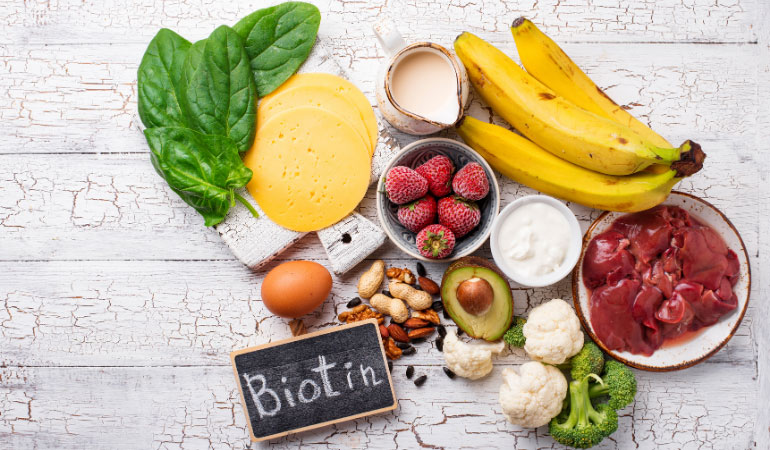What Does Biotin Do?
Biotin plays a role in many metabolic activities in the body, especially in energy formation metabolism. Although biotin is found in all tissues and organs, the organs most commonly found in the body are the kidneys and liver. In addition, biotin is a vitamin known for its benefits for hair and skin health. For this reason, it can be seen that many cosmetic products on the market contain biotin. Major Biotin benefits can be listed as follows:
- Biotin contributes to the maintenance of normal hair. Today, there is not enough evidence about the effectiveness of taking biotin as a supplement for healthy hair growth in people without biotindeficiency, but some studies show that taking biotin as a vitamin supplement from outside can accelerate hair growth in people with vitamin B7 deficiency.
- Another benefit of biotin is on the nails. Studies show that taking biotin as a supplement in those with biotin deficiency helps nails grow in a healthy way. According to studies, people with thin, weak, and brittle nails can help strengthen their nails by eating foods rich in biotin or using biotin supplements. However, more scientific studies are needed on how long and at what doses biotin should be used to strengthen nails.
- Biotin is important for skin health as well as hair and nail health. Biotin contributes to the maintenance of normal skin. Although biotin deficiency is rare in infants, studies on infants with alopecia (hair loss) show that biotin deficiency can cause skin problems such as alopecia or dermatitis.
- Biotin contributes to the normal metabolism of macronutrients such as carbohydrates, proteins, and fats in the body. Thanks to this feature, biotin contributes to the normal energy formation metabolism.
- Biotin is one of the important vitamins needed during pregnancy. Studies show that biotin supports fetal development during pregnancy.
What Foods Contain Biotin?
Many plants found in nature are rich in biotin. Therefore, it is possible to meet the body’s needs with a healthy and regular diet. Biotin-rich foods can be listed as follows:
- Eggs, especially the yolk
- Potatoes,
- Legumes such as chickpeas, beans,
- Milk and dairy products such as cheese, yogurt,
- Especially greens such as arugula and parsley,
- Almond,
- Cauliflower,
- Red and white meat,
- Peanuts and hazelnut paste.
What is Biotin Deficiency? What are the symptoms?
Although biotin deficiency is a rare condition, in some cases biotin synthesis may be adversely affected. Some metabolic disorders, unbalanced and inadequate nutrition habits, and intestinal microbiota imbalances, which are characterized by the excess of harmful bacteria in the intestines than beneficial bacteria, can cause biotin deficiency. In addition, a substance called avidin, especially found in raw eggs, may play a role in biotin absorption. In other words, the consumption of raw eggs can cause biotin deficiency. However, this does not apply to scrambled eggs. In case of biotin deficiency, various health problems can be seen, especially hair, skin, and nail health.
- Problems such as dryness and redness on the skin,
- Scaly rashes on the skin, especially around the mouth and nose,
- Weakness and easy breakage of nails,
- Drying and cracking of the lips,
- Hair breaking easily and growing harder than normal,
- Hair loss,
- Unexplained tiredness and exhaustion
- Involuntary weight loss due to decreased appetite
- sleep problems,
- Burning or tingling in various parts of the body, especially in the hands and feet
- Stomach and intestinal system problems such as vomiting, constipation, diarrhea
The symptoms listed above are common symptoms in people with vitamin B7 deficiency. Excess biotin is excreted from the body through urine and sweat, therefore, according to studies, although high doses of biotin intake are not toxic, there are not enough studies on this subject.


